The government has recently amended the Conduct of Elections Rules, 1961, on the insistence of the Election Commission. The amendment now makes it mandatory for candidates contesting Assembly & Lok Sabha elections to disclose their foreign assets & liabilities, IT Return information for five preceding years of the election.
Candidates planning to contest the elections for Legislative Assembly of the states or Lok Sabha have to fulfill certain criteria. They also have to submit a list of documents without which their nomination will be rejected.
The government has recently amended the Conduct of Elections Rules, 1961, on the insistence of the Election Commission. The amendment now makes it mandatory for candidates contesting Assembly & Lok Sabha elections to disclose their foreign assets & liabilities, IT Return information for five preceding years before the election.
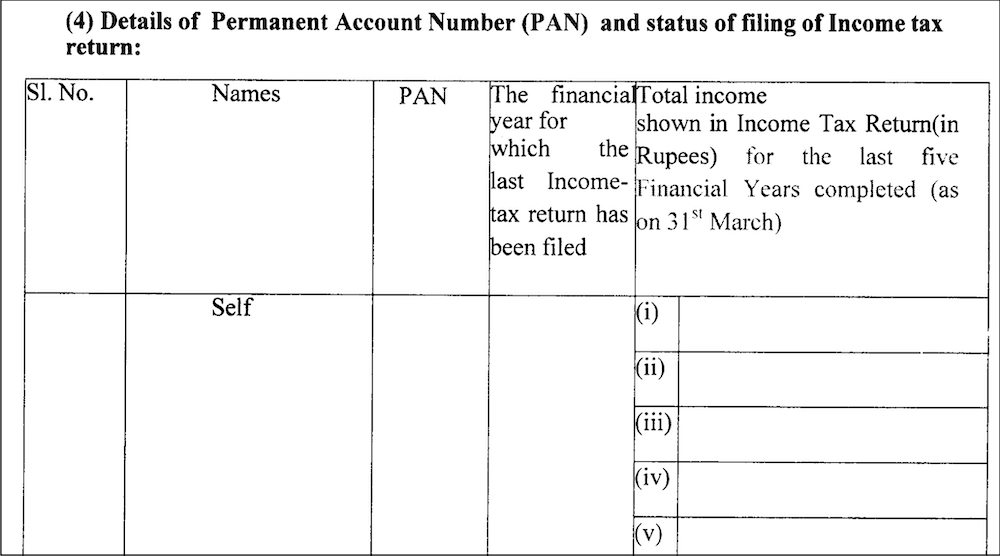
Here is a look at all the documents & details to be submitted by candidates wishing to contest the State Assembly or the Lok Sabha election.
The person wishing to contest the election has to be a citizen of India and has to satisfy the following age criteria
- Lok Sabha (House of the People) – 25 years
- Vidhan Sabha (Legislative Assembly) – 25 years
- Rajya Sabha (Council of States) – 30 years
- Vidhan Parishad (Legislative Council)- 30 years
A person must be enrolled in the current electoral roll of any of the Parliamentary Constituencies for contesting elections from a Parliamentary Constituency. For contesting elections to State Legislature, the person must be enrolled in the current electoral roll of any of the assembly constituencies within that State. There are other disqualification criteria as listed in various electoral laws.

Check List of documents to be submitted
The following check list of documents must be submitted by every contesting candidate.
- Nomination paper in Form 2A for Lok Sabha election and Form 2B for Assembly election.
- Affidavit in Form 26 with all the columns filled up and sworn before an Oath Commissioner or Magistrate of First Class or before a Notary Public. This includes details of pending criminal cases, movable & immovable assets including foreign assets, liabilities, sources of income, educational qualification etc.
- Certified extract of electoral roll (when candidate is an elector of a different constituency)
- Form A and Form B (applicable in the case of candidates set up by political parties)
- Copy of Caste certificates (if the candidate claims to belong to SC/ST)
- Security deposit
- Oath and affirmation
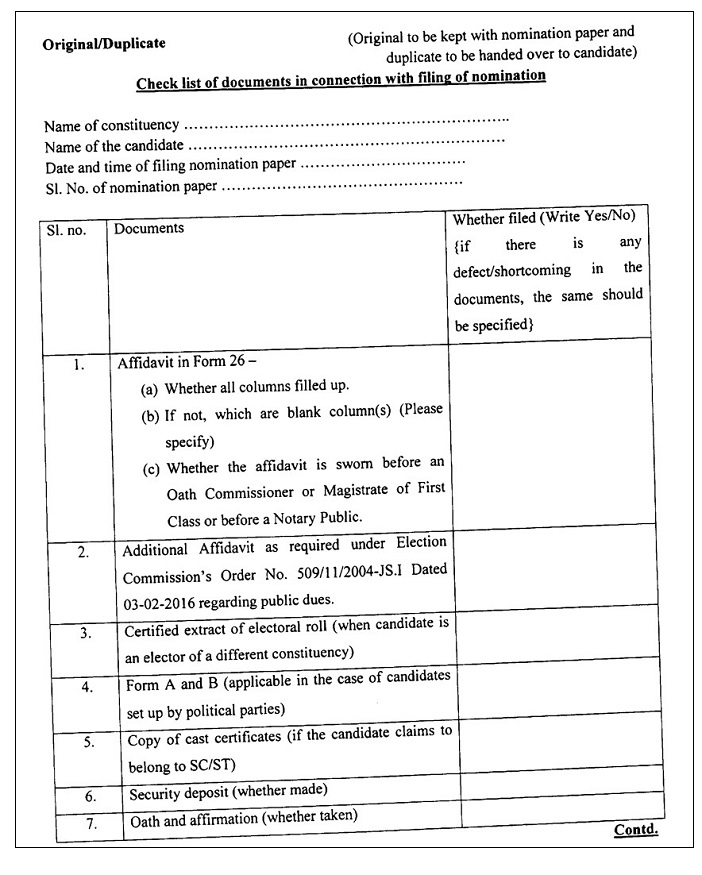 Nomination Paper
Nomination Paper
The nomination paper consists of the basic details of the candidates including a photograph. It also has details of the candidate’s name in the relevant electoral roll.
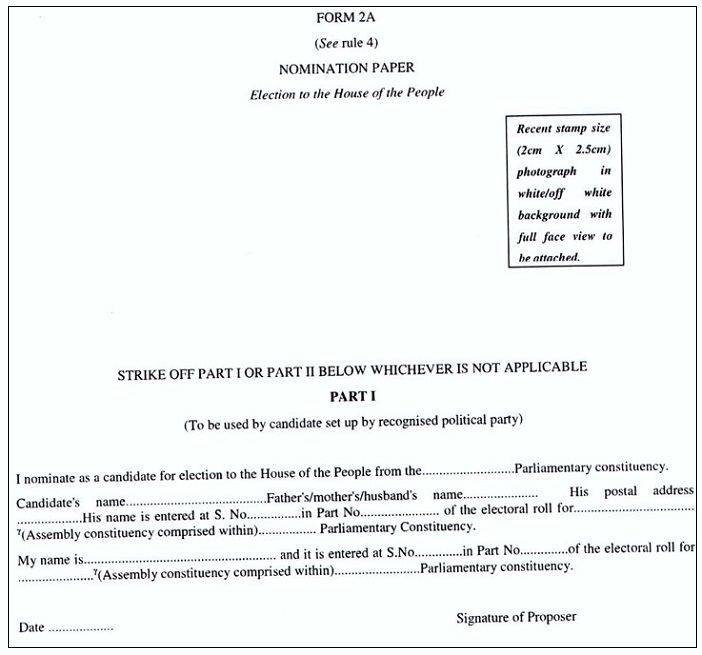
The form should also have details of the proposers in that constituency
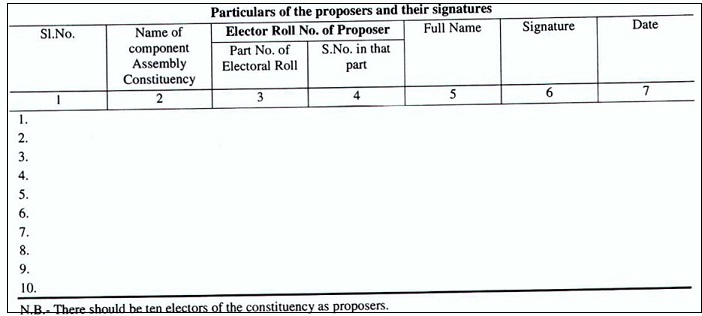
Affidavit in Form 26
The affidavit in form 26 has to be filed along with the nomination papers. The affidavit contains the following information of the candidates
- Particulars relating to criminal antecedents, if any, (cases of convictions and all pending cases)
- Details of PAN and status of filing of Income tax return (ITR) of self, spouse and dependents. The recent amendments have made it mandatory for candidates to disclose to income as declared in the ITR for the last five years along with those of the spouse, dependents and Hindu Undivided Family (HUF) where the candidate is a Coparcener
- Details of the assets (movable and immovable etc.). The recent amendments have made it mandatory for candidates to also disclose details of all deposits or investments in Foreign banks and any other institution abroad, and details of all assets and liabilities in foreign countries
- Liabilities/dues of candidate, spouse and all dependents to government and public financial institutions
- Details of profession or occupation of candidate and spouse
- Highest educational qualification of the candidate
- Contact details including telephone number, e-mail ID, social media accounts etc.
- Profession & Sources of Income of self & spouse
The candidates are required to fill up all columns in the affidavit and no column can be left blank. If there is no information to be furnished against any item, appropriate remarks such as ‘NIL’ or ‘Not Applicable’ or ‘Not Known’ as applicable should be indicated in such column. The candidate should not leave any column blank. The Affidavit should be sworn by the candidate before an Oath Commissioner or Magistrate of first class or before a Notary Public. Each page of the affidavit should be signed by the candidate and the affidavit should bear on each page the stamp of the Notary or Oath Commissioner or Magistrate before whom the affidavit is sworn.
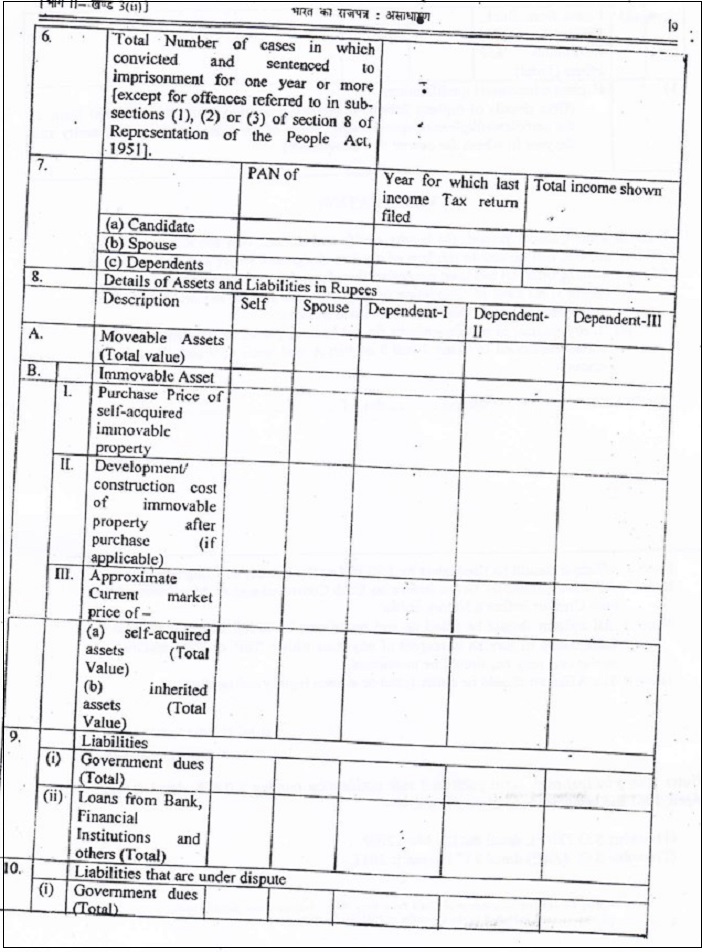
In 2017, the government notified new rules that made disclosure of sources of income mandatory. In a recent judgment, the Supreme Court has issued certain guidelines for those candidates with pending criminal cases. The following are now mandatory for all contesting candidates with pending criminal cases
- The Form 26 shall have details of pending criminal cases against the candidates in bold letters.
- If a candidate is contesting an election on the ticket of a particular party, he/she is required to inform the party about the criminal cases pending against him/her.
- The concerned political party has to publish the information pertaining to the candidates of the party with pending criminal cases both in its website and also in newspapers and Television channels.
- The candidate as well as the concerned political party are required to publish information in this regard in newspapers and through Television channels on three occasions during the campaign period.
Every candidate at the time of filing nomination paper, should also provide details of all the liabilities to public financial institutions & the government. Earlier, an additional affidavit also had to be filed with the ‘No Dues Certificate’ from the agencies providing electricity, water and telephone. He/she is also required to give details of rent, in case he had been in occupation of any government accommodation during the last 10 years. Now those details are included in Form 26. Hence the candidate is not required to file any additional affidavit.
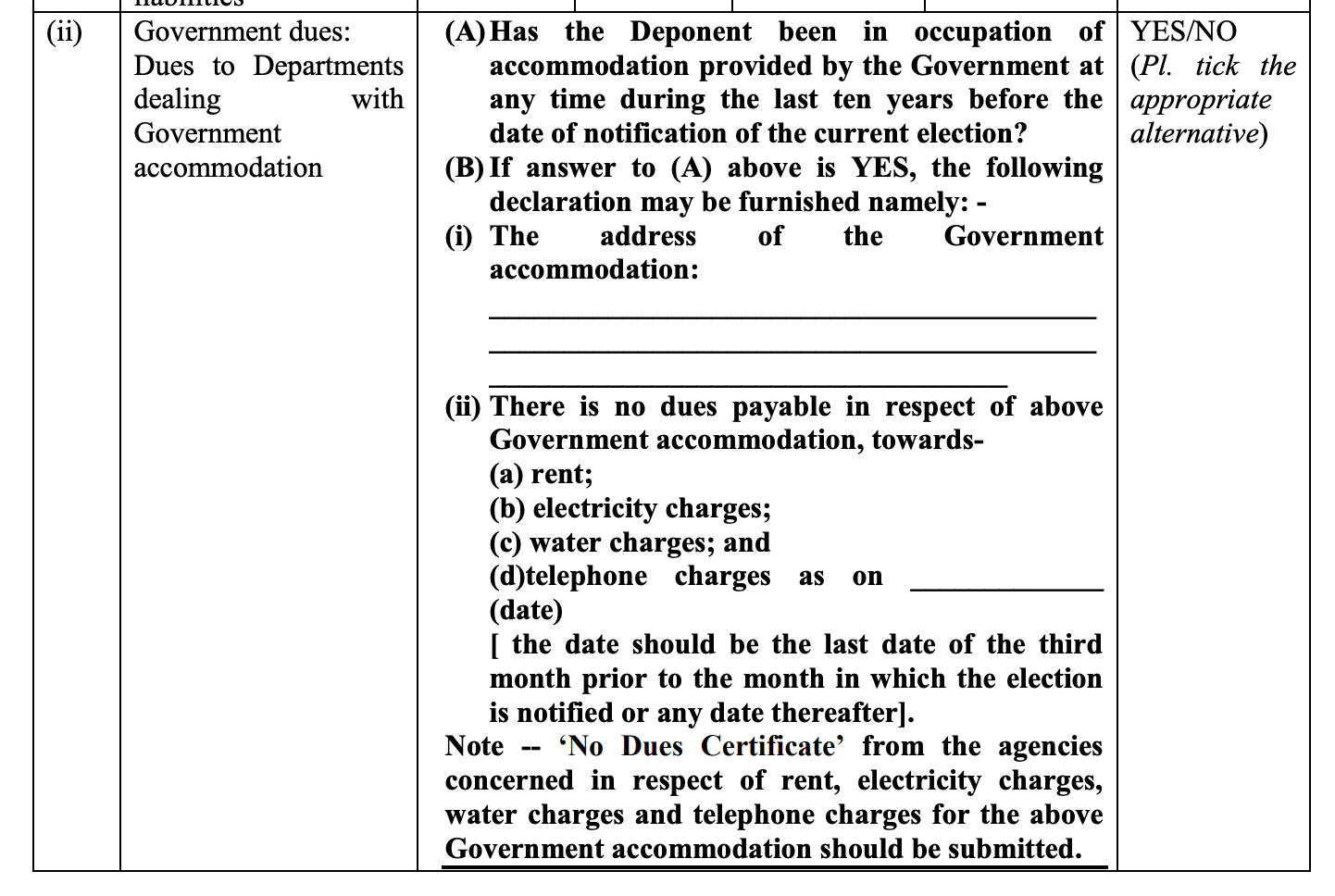 Certified extract of electoral roll
Certified extract of electoral roll
In case the candidate is registered as an elector/voter in the electoral roll of a constituency different from the constituency from which he/she stands as a candidate, then a copy of electoral roll of that constituency where the name of the candidate is entered must be attached with the Nomination paper.
Form A and Form B (applicable in the case of candidates set up by political parties)
In case a candidate is put up by any political party (whether recognised or not) then the prescribed notice from the concerned Political Party about his sponsorship in Form A and Form B, has to be submitted along with the Nomination paper. Know more about the Form B or popularly known as B-Form here.
Copy of Caste certificates (if the candidate claims to belong to SC/ST)
Candidates belonging to Scheduled Caste/Scheduled Tribes are required to submit documentary proof of being a SC/ST.
Security Deposit
The security deposit amount based on the election being contested should be deposited either in cash with the Returning Officer or by filing a challan in the Reserve Bank of India or a Government Treasury. The following is the amount of security deposit for various elections. A defeated candidate who fails to secure more than one sixth of the valid votes polled in the constituency will lose his security deposit and the amount would not be refunded to him.

Oath and affirmation
The candidate has to make an oath in the prescribed format as given in the 3rd Schedule of the Constitution, before the Returning Officer/Assistant Returning officer.

Featured Image: Checklist of documents


